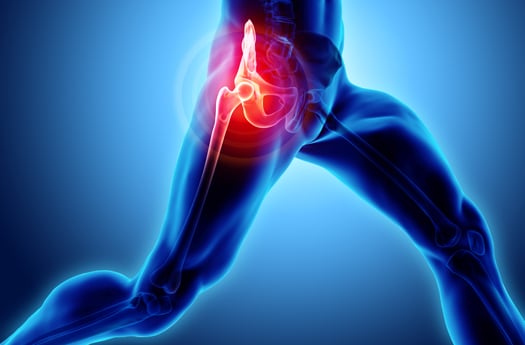
A herniated disc is a condition that can cause pain in the hips as well as other areas of the body. It occurs when a disc between the vertebrae in the spine becomes damaged and the inner portion of the disc protrudes through the outer layer. This can put pressure on the nearby nerves and cause pain in various areas of the body, including the back, legs, feet, and hips. This article explains how a herniated disc can cause hip pain as well as the steps for diagnosing and treating hip pain that results from a herniated disc.
How a Herniated Disc Can Cause Hip Pain
A herniated disc can cause hip pain, although it is not a common occurrence. The discs in the spine are cushions that separate the vertebrae and absorb shock. When a disc herniates, it means the inner gel-like material has leaked out and is putting pressure on the spinal nerves. This can cause a range of symptoms, including pain, tingling, and numbness that radiates down the legs.
In some cases involving a herniated disc, lower back pain can radiate into the hips. This is because the herniation can affect the nerves that travel from the lower back to the hips. The pain is often described as a sharp or shooting pain that can be felt in the front or back of the hip. Some people also experience weakness or a loss of sensation in the affected area.
Diagnosing Hip Pain Caused by a Herniated Disc
It is important to note there are other conditions that can cause hip pain, and a herniated disc is just one of many possible causes. Arthritis, bursitis, hip impingement, and other conditions can also cause hip pain.
A herniated disc can also cause sciatica. Sciatica is a condition that occurs when a herniated disc compresses the sciatic nerve. This can cause pain, numbness, and tingling in the legs as well as in the buttocks and hips. Sciatica usually affects only one side of the body.
Make sure to have a thorough evaluation by a doctor to determine the underlying cause of your symptoms. Diagnosis of a herniated disc causing hip pain can be made through a physical examination, medical history review, and imaging studies, such as an MRI.
Herniated Disc Treatment
Treatment options for a herniated disc that is causing hip pain can vary depending on the severity of the condition and the underlying cause. Conservative treatment options such as physical therapy, rest, ice, chiropractic care, or pain medication may be recommended. In some cases, injections can be used to reduce the inflammation and relieve pain.
Herniated Disc Surgery
If the conservative measures do not work, discectomy or microdiscectomy surgery may be recommended. Surgery for a herniated disc can involve either repairing the disc or removing it. In some cases, a combination of these procedures may be used to repair a herniated disc.
If you have a herniated disc that is not responding to conservative treatment, a discectomy may be discussed and potentially recommended. Although this is generally a very successful procedure, having a large hole in the outer ring of the disc more than doubles the risk of needing another operation. A new treatment, Barricaid, is a bone-anchored device that closes this hole, and 95 percent of Barricaid patients did not undergo a reoperation due to reherniation in a 2-year study timeframe. This treatment is done immediately following the discectomy—during the same operation—and does not require any additional incisions or time in the hospital.
If you have any questions about the Barricaid treatment, ask your doctor or contact us at 844-288-7474.
For full benefit/risk information, please visit: https://www.barricaid.com/instructions.


Comments